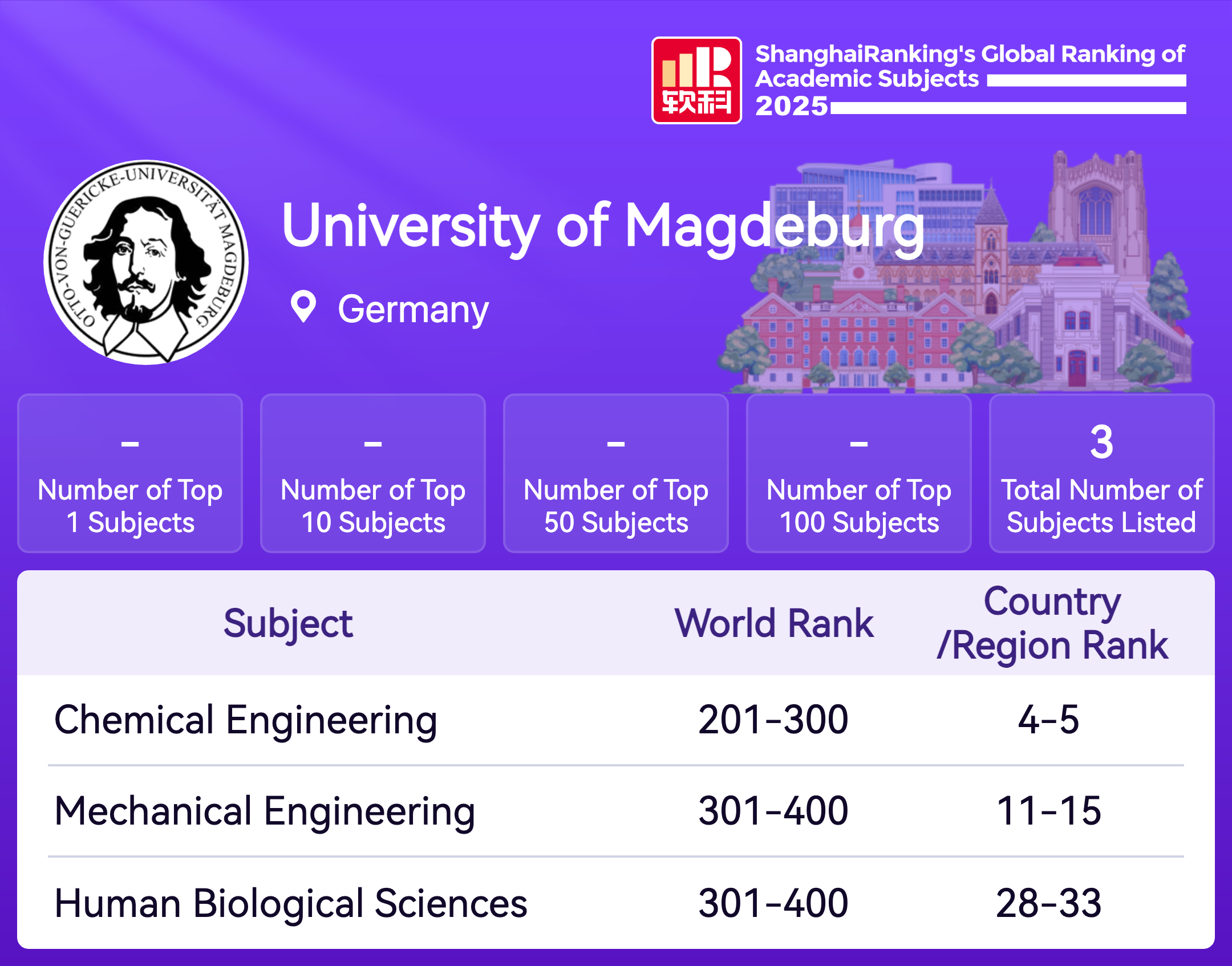 801-900
801-900 


The Otto von Guericke University Magdeburg (OVGU), founded in 1993, stands as one of Germany's youngest universities, emerging from the amalgamation of three older institutions: Magdeburg Technical University, the Teacher Training College, and the Academy of Medicine. Despite its relative youth, the university draws on a rich tradition in various fields. Located in Magdeburg, the capital city of Saxony-Anhalt, OVGU focuses on creating a lean and sharply specialized expertise in engineering, natural sciences, medicine, economics and management, as well as the social sciences and humanities—key disciplines for a modern university in the era of information and digitalization. Comprising nine faculties and hosting 13,000 students, OVGU boasts an impressive international presence, with around 4,000 students from over 100 countries. Surpassing the national average, international students constitute over 30% of the university's population. Annually, approximately 250 foreign academics and scientists contribute to the vibrant academic environment. The university's numerous partnerships with institutions in 60 countries offer students and academics from Magdeburg exceptional opportunities for study and research abroad. Dual degree programs with American, British, Ukrainian, Bulgarian, and Polish universities allow students to graduate from both institutions simultaneously. OVGU places significant emphasis on international qualifications, establishing German study programs in countries such as Ukraine and Vietnam. The university is increasingly offering courses in English to cater to global audiences. Diverse international programs, including the "Eastern Partnerships" initiative, the interactive internet platform "VOCAL" for studying abroad preparation, and the "Staff Mobility Week," underscore OVGU's commitment to global engagement. The "Integrated Welcome Weeks" provide orientation and support for students, facilitated by the International Office in collaboration with the Student Union and IKUS, a voluntary association of OVGU students. Notably, the university was awarded the E-Quality Label for ERASMUS Mobility by the National ERASMUS Agency of Germany in 2011. In 2005 the LEONARDO Office Saxony Anhalt at the University received as the first European Institution the ERASMUS Quality Prize in the category student mobility. OVGU's commitment to excellence is further evidenced by an excellent staff-student ratio, state-of-the-art facilities, flexible course structures, and strong connections to professional practice. With a constantly evolving educational portfolio, the university adapts to the complexities of a networked work and research environment. Offering over 100 bachelor and master programs, students benefit from modern laboratories, experimental workshops, and clinics equipped with high-performance computer technology. There are also many possibilities to combine different subjects across the faculties. Magdeburg's unique selling points include dual study programs certified by the Chamber of Industry and Commerce, where university study programs integrate with vocational education and training in a company setting. Since 2023, OVGU has been a partner in the EU-Green Alliance, collaborating with eight other European universities to establish a Europe-wide education and research network focused on sustainable development. OVGU's research efforts are concentrated in four research centers: the Center for Dynamic Systems (CDS), Center for Behavioral Brain Sciences (CBBS), Center for Health & Medical Prevention (CHaMP), and Center for Advanced Medical Engineering (CAME). Additionally, the university conducts industry-related and application-oriented research to bolster the regional economy, focusing on areas such as medical technology, automotive, renewable energies, particle technology, research, computational visualistics, and experimental economics. Affiliated institutes and the University's Technology Transfer Center serve as crucial links between academia and industry, facilitating access to research resources for businesses and promoting innovation. The Faculty of Medicine and the University Clinic, located on their dedicated campus, host around 1600 trainee doctors. OVGU's research profile is technically oriented, characterized by interdisciplinary cooperation across engineering, natural and life sciences, business studies, humanities, and social sciences. The university's close collaboration with esteemed research institutions, including the Max Planck Institute for Dynamics of Complex Technical Systems, the Fraunhofer Institute for Factory Operation and Automation, the Leibniz Institute for Neurobiology, and the German Center for Neurodegenerative Diseases, enhances its research capabilities. OVGU's research profile is technically oriented, characterized by interdisciplinary cooperation across engineering, natural and life sciences, business studies, humanities, and social sciences. The university's close collaboration with esteemed research institutions, including the Max Planck Institute for Dynamics of Complex Technical Systems, the Fraunhofer Institute for Factory Operation and Automation, the Leibniz Institute for Neurobiology, and the German Center for Neurodegenerative Diseases, enhances its research capabilities. Since 2010, Ph.D. students at Magdeburg benefit from the comprehensive support provided by the Graduate Academy, ensuring optimal working conditions and integration across disciplines. In summary, OVGU stands as a dynamic and internationally recognized institution, offering a diverse educational portfolio, cutting-edge research initiatives, and a commitment to global collaboration and sustainability.
 801-900
801-900 
| Subject | Rank |
|---|---|
Chemical Engineering | 201-300 |
Mechanical Engineering | 301-400 |
Human Biological Sciences | 301-400 |

